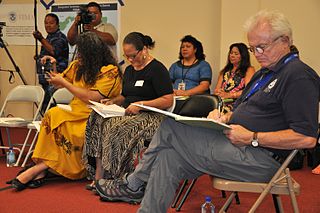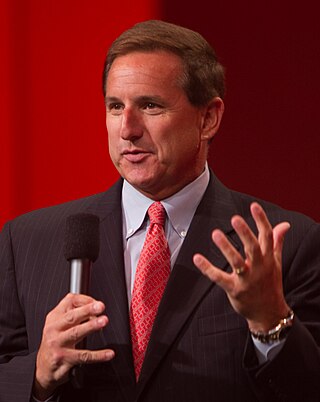
Industrial espionage, also known as economic espionage, corporate spying, or corporate espionage, is a form of espionage conducted for commercial purposes instead of purely national security.
Oracle Corporation is an American multinational computer technology company headquartered in Austin, Texas. Co-founded in 1977 by Larry Ellison, who remains executive chairman, Oracle ranked as the third-largest software company in the world by revenue and market capitalization as of 2020, and the company's seat in Forbes Global 2000 was 80 in 2023.

Public relations (PR) is the practice of managing and disseminating information from an individual or an organization to the public in order to influence their perception. Public relations and publicity differ in that PR is controlled internally, whereas publicity is not controlled and contributed by external parties. Public relations may include an organization or individual gaining exposure to their audiences using topics of public interest and news items that do not require direct payment. The exposure is mostly media-based, and this differentiates it from advertising as a form of marketing communications. Public relations often aims to create or obtain coverage for clients for free, also known as earned media, rather than paying for marketing or advertising also known as paid media. However, advertising is also a part of broader PR activities.
Consumer privacy is information privacy as it relates to the consumers of products and services.
A conflict of interest (COI) is a situation in which a person or organization is involved in multiple interests, financial or otherwise, and serving one interest could involve working against another. Typically, this relates to situations in which the personal interest of an individual or organization might adversely affect a duty owed to make decisions for the benefit of a third party.
In business, a competitive advantage is an attribute that allows an organization to outperform its competitors.
A consultant is a professional who provides advice or services in an area of specialization. Consulting services generally fall under the domain of professional services, as contingent work.
A data broker is an individual or company that specializes in collecting personal data or data about people, mostly from public records but sometimes sourced privately, and selling or licensing such information to third parties for a variety of uses. Sources, usually Internet-based since the 1990s, may include census and electoral roll records, social networking sites, court reports and purchase histories. The information from data brokers may be used in background checks used by employers and housing.

Mark Vincent Hurd was an American technology executive who served as CEO and as a member of the board of directors of Oracle Corporation. He had previously served as chairman, chief executive officer, and president of Hewlett-Packard, before his forced resignation in 2010. He was also on the board of directors of Globality and was a member of the Technology CEO Council and board of directors of News Corporation until 2010.
Competitive intelligence (CI) is the process and forward-looking practices used in producing knowledge about the competitive environment to improve organizational performance. Competitive intelligence involves systematically collecting and analysing information from multiple sources and a coordinated competitive intelligence program. It is the action of defining, gathering, analyzing, and distributing intelligence about products, customers, competitors, and any aspect of the environment needed to support executives and managers in strategic decision making for an organization.
Marketing intelligence (MI) is the everyday information relevant to a company's markets, gathered and analyzed specifically for the purpose of accurate and confident decision-making in determining market opportunity, market penetration strategy, and market development metrics. Marketing intelligence is necessary when entering a foreign market.
Business war gaming, corporate war gaming or business wargaming is an adaptation of the art of simulating moves and counter-moves in a commercial setting. In a complex global and competitive world, formulating a plan without testing it against likely external reactions is the equivalent of walking into a battlefield without the right weapons or a plan to win. In situations where the cost of being wrong is high, war games can be very helpful to understand from a 360-degree perspective the external opportunities and challenges of all the key stakeholders in the industry.

The Hewlett-Packard Company, commonly shortened to Hewlett-Packard or HP, was an American multinational information technology company headquartered in Palo Alto, California. HP developed and provided a wide variety of hardware components, as well as software and related services to consumers, small and medium-sized businesses (SMBs), and fairly large companies, including customers in government, health, and education sectors. The company was founded in a one-car garage in Palo Alto by Bill Hewlett and David Packard in 1939, and initially produced a line of electronic test and measurement equipment. The HP Garage at 367 Addison Avenue is now designated an official California Historical Landmark, and is marked with a plaque calling it the "Birthplace of 'Silicon Valley'".
Seena Sharp, author of Competitive Intelligence Advantage, is a recognized leader in Competitive Intelligence. She founded one of the first competitive intelligence company, Sharp Market Intelligence, in the US in 1979, in Los Angeles, a company that serves clients across the US, Canada, Europe, Asia, and Africa.
Market intelligence (MI) is gathering and analyzing information relevant to a company's market - trends, competitor and customer monitoring. It is a subtype of competitive intelligence (CI), which is data and information gathered by companies that provide continuous insight into market trends such as competitors' and customers' values and preferences.
Porter's four corners model is a predictive tool designed by Michael Porter that helps in determining a competitor's course of action. Unlike other predictive models which predominantly rely on a firm's current strategy and capabilities to determine future strategy, Porter's model additionally calls for an understanding of what motivates the competitor. This added dimension of understanding a competitor's internal culture, value system, mindset, and assumptions helps in determining a much more accurate and realistic reading of a competitor's possible reactions in a given situation.
Yves-Michel Marti is a pioneer in the field of Competitive Intelligence. He is the founder of Egideria and of the French branch of the Society of Competitive Intelligence Professionals.
The Fuld-Gilad-Herring Academy of Competitive Intelligence is an educational organization bringing professional training to the field of competitive intelligence (CI). Established in 1996, the academy has expanded its training to thousands of managers from 58 countries and six continents at its campuses in Cambridge, MA and Brussels, Belgium. The academy is the only CI-dedicated institution to be externally accredited by the International Accreditors for Continuing Education and Training (IACET). It grants the Competitive Intelligence Professional (CIP) certification based on a 9-course program, including a course in ethics and a pioneering course in business war gaming. To be certified, managers must complete the required coursework and pass a certification exam. To accommodate managers whose main interest is in using CI tools and managers working as CI professionals, the academy offers two levels of certification: a basic CIP-I, and an advanced CIP-II. The academy is currently the largest training institute in its field.
A human resources management system (HRMS), also human resources information system (HRIS) or human capital management (HCM) system, is a form of human resources (HR) software that combines a number of systems and processes to ensure the easy management of human resources, business processes and data. Human resources software is used by businesses to combine a number of necessary HR functions, such as storing employee data, managing payroll, recruitment, benefits administration, time and attendance, employee performance management, and tracking competency and training records.
Economic consulting is the practice of providing advanced economic, financial, and statistical analysis for use in a litigation environment. Law firms, state institutions, and other organizations may rely on economic consultants to produce research, analyses, reports, and testimony to be used in trial.



